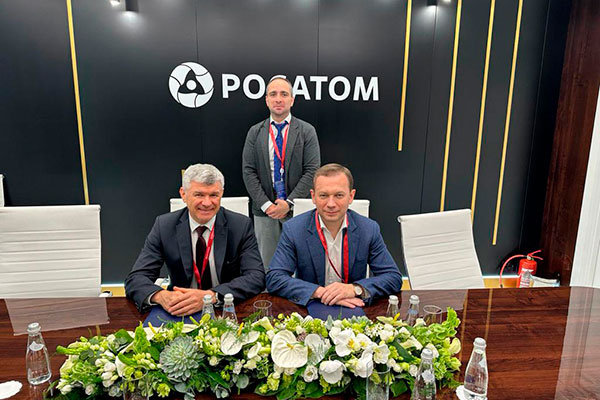TSS Group and Rosatom have signed an agreement to build an energy fleet based on floating nuclear power units for international markets

On June 15, 2023, during the St. Petersburg International Economic Forum, representatives of TSS Group and Rosatom, the State Corporation for Atomic Energy, held a meeting. As part of TSS Group's strategy to provide energy for the oil and gas sector in the Middle East, the company's representatives signed a framework agreement outlining the key terms for building an energy fleet based on floating nuclear power units (FNPPs) with RITM-200M reactors for international markets.
The parties have planned the establishment of a joint venture that will facilitate the construction of a series of FNPPs with a capacity of at least 100 MW and a service life of up to 60 years. The joint venture aims to subsequently sell the electricity generated by the FNPPs in the markets of the Middle East, Southeast Asia, and Africa. The launch of the energy fleet is scheduled for the period from 2029 to 2036.
Floating nuclear power units (FNPPs) are a new, efficient, and environmentally friendly solution for addressing energy supply challenges in remote areas, large-scale investment projects in mineral extraction, and energy-intensive industrial facilities. The modularity of FNPPs allows for rapid and flexible scaling of power generation, ensuring that customers receive the required amount of energy. FNPPs have significant commercial potential both in Russia and abroad, offering the opportunity to secure predictable electricity prices for decades ahead.
Sergey Velichko, Chairman of the Board of Directors of TSS Group, signed the agreement and explained: "The issue of ecology and low-carbon energy generation, in particular, is becoming increasingly relevant worldwide. The changes in the Middle East markets indicate the high demand for such a source of energy, and we clearly see that. Solutions for generating 'green' products such as hydrogen, LNG, ammonia, methanol, will undoubtedly be in demand in the coming decades, not to mention addressing energy consumption issues here and now, as in several African countries. Investing in floating nuclear power units is not only a guarantee of stable profitability but also an investment in a more environmentally friendly and predictable future for us and our children."
After putting his signature on the agreement, Andrey Nikipelov, Deputy CEO for Engineering and Industrial Solutions at Rosatom, commented: "Since the commissioning of the world's first floating nuclear power station, the Akademik Lomonosov, in 2019, both state-owned and commercial companies in Russia and abroad have shown great interest in this new product from Rosatom. We are now offering a whole family of FNPPs to the market, varying in capacity and purpose, designed for both Arctic and tropical environments. In addition to the environmental friendliness and operational stability, floating nuclear power units are capable of providing energy independence, not only from main power grids but also in a broader sense, protecting against the volatility of energy markets. This project will contribute to the introduction of Russian high technologies to new markets and, most importantly, provide better living conditions for people and foster economic development in different regions of the world."
